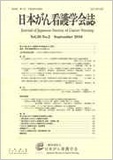Japanese
English
- 販売していません
- Abstract 文献概要
- 参考文献 Reference
要旨
手足症候群(以下,HFS)のマネジメントには,患者の日常生活におけるさまざまな要因が関連していると考えられるが,HFSに関する患者の生活やセルフマネジメントの実態はあまり分かっていない.本研究は,外来でカペシタビン治療を受ける再発・進行乳がん患者が,どのようにHFSマネジメントを行っているかを明らかにするため,21名の患者に半構造的面接法による調査を行った.データは逐語録に起こし,質的データ分析法に基づいて分析した.その結果,研究参加者の行うHFSマネジメントは,『治療継続と自分らしい生活の両立』という現象であることが分かった.
これは,【HFSが治療や生活に及ぼす影響の認識】【手足の皮膚の変化に対する関心】【手足の皮膚をいたわる努力】【努力を続けていける見込み】【現状と治療目標のすり合わせ】の5カテゴリーから成り,これらが循環していくプロセスとして構造化された.【現状と治療目標のすり合わせ】は,療養生活における優先順位を再考し,治療目標の修正や治療に関する体験の意味づけを行うもので,HFSの症状や,予防策を行うことによる生活への影響を考慮しながら,おのおのの治療目標を吟味して,治療の継続と自分らしい生活の維持の両方を目指そうとしていた.
医療従事者は,カペシタビン治療を受ける患者に対して,一般的な知識の提供に留まらず,治療における意思決定支援を含めた,療養生活全体についてアセスメントし,個別的なサポートを継続していくことで,患者のHFSマネジメントを強化できると考えられる.
Background:Hand-foot syndrome (HFS) adversely affects quality of life. There are many factors to consider regarding the management of HFS and patients' daily life. However, self-management of HFS is not fully understood.
Aim:To explore how breast cancer patients treated with capecitabine prevent or manage HFS.
Methods:Twenty one recurrent or advanced breast cancer patients who were treated with capecitabine were enrolled in this study. Data was collected by semi-structured interviews based on the interview guidelines. All interviews were recorded and transcribed verbatim, and analyzed using qualitative data analysis.
Results:Breast cancer patients' management of HFS was described as “Achieving a good balance between continuing the treatment and maintaining quality of life”. This included five categories:(1)“Risk perception for damage caused by HFS”,(2)“Awareness of skin alterations”,(3)“Efforts to care for skin alterations”,(4)“Prospects related to continuance of self care”, and(5)“Accommodating the differences between actual health status and treatment goals”. These five categories were identified as a cyclical pr.(5)“Accommodating the differences between actual health status and treatment goals” means reconsidering life priorities, alterating treatment goals, and searching for meaning related to experiences of treatment. The participants pursue the act of “Achieving a good balance between continuing the treatment and maintaining quality of life” while considering how HFS affects their own life.
Conclusion: Healthcare providers must not only provide knowledge but also help patients make inportant life decisions related to treatment. Then, we can send them down the correct path towards self-management.
Copyright © 2016, Japanese Society of Cancer Nursing All rights reserved.


